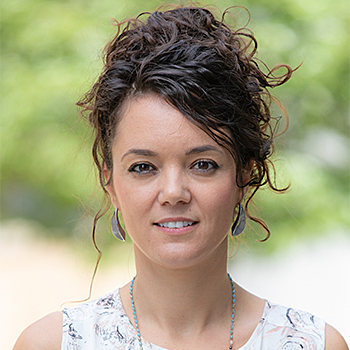ChE Seminar: Dr. Eranda Nikolla
| Event Date: | March 7, 2024 |
|---|---|
| Speaker: | Dr. Eranda Nikolla |
| Speaker Affiliation: | University of Michigan |
| Time: | 3:00-4:15 p.m. |
| Location: | FRNY G140 |
| Contact Name: | Joshua Gonzalez |
| Contact Phone: | 765-494-4365 |
| Contact Email: | jgonzal@purdue.edu |
| Open To: | Attendance required for ChE PhD students |
| Priority: | No |
| School or Program: | Chemical Engineering |
| College Calendar: | Show |

Bio:
"Engineering Oxide Structures and Architectures for Efficient Energy and Chemical Conversion"
Abstract:
Shaping the energy landscape toward renewable energy resources is a contemporary challenge that will require significant advancements in the development of catalysts and electrocatalysts for energy and chemical conversion processes. The goal of our research group is to design heterogeneous catalytic structures and architectures for these processes that are active, selective, and stable.
Our group has focused on engineering the structure of nonstoichiometric mixed metal oxide electrocatalysts as an avenue for generating robust heterogeneous catalysts for electrochemical transformations related to energy conversion and storage (these include oxygen reduction/evolution reactions (ORR/OER) and CO2 reduction). Specifically, I will discuss our work on combining controlled synthesis, kinetic analysis, advanced characterization, and ab initio calculations to identify the factors that govern the activity and stability of nonstoichiometric mixed metal oxide electrocatalysts for ORR/OER. We have shown that (i) the electronic structure of the transition metal cations in nonstoichiometric mixed metal oxide electrocatalysts can be systematically tuned via oxide compositional variations to achieve the outmost reactivity, and (ii) the oxide framework can act as a platform forin situgeneration of highly catalytically active surfaces under electrochemical conditions.
We have also used oxides as overlayers to control the 3-dimensional environment of metal catalytic sites and tune the activity/selectivity for targeted thermal catalytic reactions. Specifically, I will discuss our work on utilizing reducible metal oxide encapsulated noble metal catalytic structures to promote hydrodeoxygenation (HDO) of biomass-derived compounds. We have demonstrated that the enhancement in HDO activity/selectivity induced by the encapsulation of the metal nanoparticles with a porous oxide film results from the high interfacial contact between the metal and metal oxide sites, and the restrictive accessible conformations of aromatics on the metal surface.
